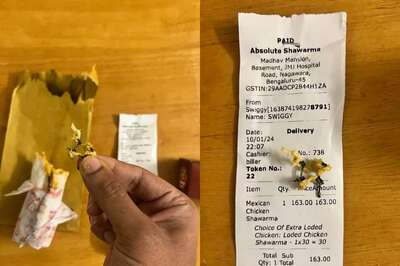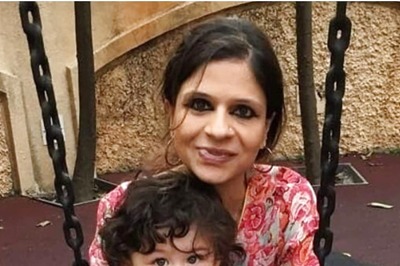
views
Following a Weight Loss Diet

Include lean protein at each meal to support your weight loss. Protein is an essential nutrient, but it’s especially important for weight loss. It can help support your metabolism and helps rebuild your muscle tissues. At meals, fill 1/4 of your plate with lean protein. Additionally, snack on protein sources like low-fat dairy and nuts. To make sure you’re getting enough protein, figure out how much you need. Aim to consume about 1.2-1.6 grams of protein per 1 kg (2.2 lb) of body weight per day. Spread your protein throughout the day by eating about 25-30 grams of protein per meal. For example, if you weigh 120 kg (260 lb) you would need somewhere between 144-192 grams of protein per day if you want to try a high protein diet. Make sure this diet will fit well with your daily caloric goal, as well. Stick to lean protein choices as these foods also contain fewer calories. This includes skinless poultry, lean beef or pork, seafood, legumes, tofu, low-fat dairy, eggs, beans, lentils, seeds (like hemp and chia), and nuts. You can even count some grains as a serving of lean protein, such as buckwheat, amaranth, and quinoa.

Build your meals and snacks around fruits and veggies. Eating produce helps you lose weight because it has low calories but is very filling. Additionally, fruits and vegetables are packed with nutrients, including fiber. Fill half your plate with fruits and veggies at meal times and snack on fruits and veggies if you’re hungry between meals. If you’re measuring out serving sizes, include 1-2 servings of fruits or vegetables per meal. One portion is equal to four heaped tablespoons of cooked kale or spinach, one medium fruit (like an apple or pear), 30 g dried fruit (like raisins), or a 5 centimeter (2 in) slice of a large fruit (like melon or papaya).

Eat 100% whole grains but avoid refined or processed grains. Good choices include grains like oats, quinoa, buckwheat, and brown rice, as well as whole grain pasta. 100% whole grains are a more nutritious choice compared to refined grains like wheat bread, white flour or white rice. Include whole grains as 1/4 of your meals, but try to avoid processed or refined grains. 100% whole grains are less processed and are typically higher in fiber, protein and other beneficial nutrients. Processed grains have these nutrients stripped and are therefore less nutritious. Keep your grain intake to a minimum. There has been some research that lower carb diets or those that limit grains result in faster weight loss than low-calorie diets alone. Also, stick to the appropriate servings of grains. Measure out about 28 g (1 oz) of grains like cooked oats or quinoa when you choose to eat them.

Control hunger by staying hydrated. When you’re thirsty, you might think your thirst signals are hunger. To stay hydrated, drink at least 11.5 cups (2.7 L) of water daily if you’re a woman or 15.5 cups (3.7 L) of water daily if you’re a male. Drinking enough water is great for your health and may also help support your weight loss. Also, filling up on water can help decrease hunger throughout the day, which can help decrease snacking or nibbling on extra calories.

Count your calories so you can cut 500-750 calories daily. You’ll need to eat fewer calories than you need in order to lose weight. Use a food journal, calorie tracking website, or smartphone app to find out how many calories you need and to track the calories for each food you consume. Aim to cut 500-750 calories a day from your diet, which will help you lose .5 to 1 kg (1.1 to 2.2 lb) each week. Replace juice or soda with water or opt for a light salad for one meal a day.Tip: Talk to your doctor before beginning a diet plan, especially if you’re on medication or have a health condition. They’ll help you determine how much weight is safe for you to lose and which diets are safe for you to try. If you combine diet and exercise, you may be able to lose 1.3 kg (2.9 lb) per week. However, there’s no guarantee that you’ll see these results. Talk to your doctor to find out the minimum number of calories you need to eat everyday to protect your health. Generally, you shouldn't eat less than 1,200 calories daily because you may not get enough nutrients. However, keep in mind that tracking your calories can be tricky, so you may be eating more than you think.
Exercising and Changing Your Lifestyle

Exercise 6 days a week to burn more calories. To lose weight fast, you’ll likely need to combine diet and exercise. Generally, you need 30 minutes of moderate exercise at least 5 days a week for good health. However, you’ll likely need to exercise longer to meet your weight loss goal. Choose an exercise that you enjoy so it’s easy to stick to your goal. For instance, walk, run, play a sport, take a dance class, join a gym, or swim laps. The number one calorie burner for physical activity is cardio. Aim for 150 minutes a week of moderate-intensity activities (what you would consider a 5-6 out of 10 of your maximum effort) or 75 minutes of high-intensity exercise (a 7-8 out of 10 for effort). Additionally, do strength training 2 times a week to support healthy muscles. These exercises may also help support a faster metabolism over time, as a larger amount of muscle mass burns more calories, even while you are at rest! Take more steps during the day. Moving as much as you can throughout the day can also add to your total calories burned throughout the day. Try parking farther away, taking the stairs instead of the elevator and standing more than you sit.Tip: Check with your doctor before you increase your activity level or begin a new exercise program. They’ll make sure you’re physically ready to make the changes you plan to make.

Sleep for 7-9 hours a night so your body can repair itself. Even in a short 30-day period, inadequate sleep may have an effect on your weight loss. Get enough sleep each night to help you reach your goal. If you’re a teen, you need to sleep for 8-10 hours a night. Work on improving your sleep hygiene, which includes going to bed earlier and making your bedroom a good environment for sleep. Not getting enough sleep might make you struggle to lose weight because your body secretes hunger hormones and you will likely crave higher fat, higher carb foods. Additionally, being tired may make you less motivated to stay on track with your exercise and healthy eating plan.

Manage stress to keep your hormones balanced. Like sleep, chronic stress or low-grade stress can work against your weight loss. That’s because stress releases hormones like cortisol, which can increase hunger and make it hard to lose. Choose coping strategies that help you feel less stressed. Then, incorporate them into your daily life so you don’t get overwhelmed. In addition, stress can make you feel tired and fatigued, which can throw you off track from your meal prepping, exercising, and other healthy lifestyle changes. Try doing some relaxing, stress-relieving activities like meditating, listening to music, talking to a supportive friend, playing with your pet, coloring in an adult coloring book, or taking a walk.
Having the Right Mindset

Journal to keep track of your progress. Within your 30-day period, it might be helpful to start a weight loss journal. Take notes about your food intake, exercise, and overall progress. Additionally, write about any challenges or successes you have during your 30 day diet. When trying to lose 6 kg in 30 days, you may realize you cannot make your exact goal at the end of that 30 days — that's okay. If you've kept a journal about your successful diet and exercise plan, you can continue with these notes until you actually do meet your goal. Write down your meal plans or record what you eat in your journal. This will be very helpful to you if you continue with your weight loss. You'll be able to see what works and what doesn't. You may also want to write down notes about what exercise plan or pattern works best for you, as well. You can also use websites or apps on your smartphone to track your calories and exercise.

Write out motivational quotes to help you stay on track. It can be difficult to follow a strict diet for an entire month. Keeping your goals and motivations front and center can help keep you focused. Write out motivational sayings and post them where you’ll see them every day. For instance, write them in your journal or on post-it notes. Then, stick them on the fridge, on your desk at work, or by your bedside. Think about why you want to lose weight. Is it to get into a smaller pant size? Is it to help you feel more confident? Or to help you manage a chronic disease? Write out these reasons so you can be reminded of the reason why you want to lose weight. When you're feeling challenged or down about your diet, review these little quotes and motivational sayings. Repeat them to yourself so you can start to feel a little more positive about sticking to your plan.

Stay accountable so you won’t give up. Pick someone or something to keep you accountable. This might be a friend, family member, your food journal, or the scale. This will help keep you accountable when you're trying to lose weight. Tell friends and family members about your 30-day diet and desire to lose some weight. You can have them support you, but you can also call, text or email them your progress. Getting on the scale regularly is another way to stay accountable. Those who weigh in often generally see more weight loss in the long-term. Don't weigh yourself too often, though — once or twice a week is enough to track your progress.




















Comments
0 comment